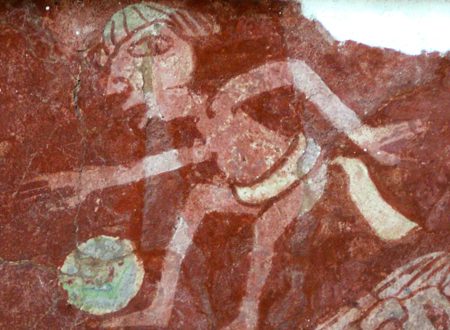 To be released in October 2009, the Hollywood-made film Agora – set in Alexandria, Egypt, 391 AD, directed by Alejandro Amenbar and starring Rachel Weisz – about the life and death of the Greek scholar Hypatia of Alexandria should be next in the long line of ‘historically correct’ blockbusters that succeed at capturing the attention of a wide audience. The film contains everything it needs – pretty heroine (including love story with Davus) gets killed over science vs. religion conflict and thus becomes a martyr – to appeal to a large crowd and to generate a huge amount of ticket sales. But is it indeed that historically correct?
To be released in October 2009, the Hollywood-made film Agora – set in Alexandria, Egypt, 391 AD, directed by Alejandro Amenbar and starring Rachel Weisz – about the life and death of the Greek scholar Hypatia of Alexandria should be next in the long line of ‘historically correct’ blockbusters that succeed at capturing the attention of a wide audience. The film contains everything it needs – pretty heroine (including love story with Davus) gets killed over science vs. religion conflict and thus becomes a martyr – to appeal to a large crowd and to generate a huge amount of ticket sales. But is it indeed that historically correct?
Tom O’Neil at Armanium Magnum is quite sceptical about the upcoming release:
Now normally I’d be delighted that someone was making a film set in the 5th Century (at least, one that wasn’t another fantasy about “King Arthur” anyway). After all, it’s not like there’s a shortage of remarkable stories to tell from that turbulent and interesting time. And normally I’d be even more delighted that they are actually bothering to make it look like the Fifth Century, rather than assuming because it’s set in the Roman Empire everyone needs to be wearing togas, forward combed haircuts and lorica segmentata. And I would be especially delighted that they are not only doing both these things but also casting the delightful Rachel Weisz in the lead role, since she’s an excellent actress and, let’s face it, pretty cute.
So why am I not delighted? Because Amenabar has chosen to write and direct a film about the philosopher Hypatia and perpetuate some hoary Enlightenment myths by turning it into a morality tale about science vs fundamentalism.
The Real Hypatia & Her Death
 Although Hipatia from Alexandria isn’t that well documented as some other great philosophers of her age, there are quite a few facts we know for (semi)certain. Born the daughter of Theon, she lived in Alexandria, Egypt during the 4th century BC, where she quickly gained the reputation of being an excellent mathematician, astronomer and philosopher. Although she’s known to general public mostly as ‘the lady who rebuffed a suitor by showing him her menstrual rags, claiming they demonstrated that there was “nothing beautiful” about carnal desires – the contemporary Christian historiographer Socrates Scholasticus described her in his Ecclesiastical History as a wise and respected person:
Although Hipatia from Alexandria isn’t that well documented as some other great philosophers of her age, there are quite a few facts we know for (semi)certain. Born the daughter of Theon, she lived in Alexandria, Egypt during the 4th century BC, where she quickly gained the reputation of being an excellent mathematician, astronomer and philosopher. Although she’s known to general public mostly as ‘the lady who rebuffed a suitor by showing him her menstrual rags, claiming they demonstrated that there was “nothing beautiful” about carnal desires – the contemporary Christian historiographer Socrates Scholasticus described her in his Ecclesiastical History as a wise and respected person:
There was a woman at Alexandria named Hypatia, daughter of the philosopher Theon, who made such attainments in literature and science, as to far surpass all the philosophers of her own time. Having succeeded to the school of Plato and Plotinus, she explained the principles of philosophy to her auditors, many of whom came from a distance to receive her instructions. On account of the self-possession and ease of manner, which she had acquired in consequence of the cultivation of her mind, she not infrequently appeared in public in presence of the magistrates. Neither did she feel abashed in going to an assembly of men. For all men on account of her extraordinary dignity and virtue admired her the more.
Malcolm listed an interesting overview of Hypatia’s portrayals in ‘popular culture’, ranging from ancient world biographies, to Raphaels portrait from her, and even a more contemporary portrait, ‘painted’ by famous graphic novelist Hugo Pratt.
Hipatia knew both political fractions – led by the Prefect of the City Orestes and Bishop Cyrel – in the city of Alexandria well. It needs to be noted that both Orested and bishop Cyrel were Christian. Orestes and Cyril soon came into conflict over Cyril’s hard-line actions against smaller Christian factions like the Novatians and his violence against Alexandria’s large Jewish community. After a pogrom against Jewish synagogues led by Cyril, Orestes complained to the Emperor but was over-ruled. Tensions between the supporters of the Bishop and those of the Prefect then began to run high in a city that was known for mob rule and vicious street violence. It was one of those mobs – a group of monks from remote monasteries that came into the city to support Bishop Cyril – that killed Hypatia. In the 5th century, Socrates Scholasticus wrote on this:
 Hipatia fell a victim to the political jealousy which at that time prevailed. For as she had frequent interviews with Orestes, it was calumniously reported among the Christian populace, that it was she who prevented Orestes from being reconciled to the bishop. Some of them therefore, hurried away by a fierce and bigoted zeal, whose ringleader was a reader named Peter, waylaid her returning home, and dragging her from her carriage, they took her to the church – called Caesareum, where they completely stripped her, and then murdered her with tiles. After tearing her body in pieces, they took her mangled limbs to a place called Cinaron, and there burnt them. This affair brought not the least opprobrium, not only upon Cyril, but also upon the whole Alexandrian church. And surely nothing can be farther from the spirit of Christianity than the allowance of massacres, fights, and transactions of that sort.
Hipatia fell a victim to the political jealousy which at that time prevailed. For as she had frequent interviews with Orestes, it was calumniously reported among the Christian populace, that it was she who prevented Orestes from being reconciled to the bishop. Some of them therefore, hurried away by a fierce and bigoted zeal, whose ringleader was a reader named Peter, waylaid her returning home, and dragging her from her carriage, they took her to the church – called Caesareum, where they completely stripped her, and then murdered her with tiles. After tearing her body in pieces, they took her mangled limbs to a place called Cinaron, and there burnt them. This affair brought not the least opprobrium, not only upon Cyril, but also upon the whole Alexandrian church. And surely nothing can be farther from the spirit of Christianity than the allowance of massacres, fights, and transactions of that sort.
Error:Hypatia of Alexandria, Slaughtered for Science?
‘Agora’ Official Trailer:
The plot description of ‘Agora’ does not mention the philosopher’s tragic death at all, but rather seems to focus on the love Hypatia’s Disciple – played by Jordan Kiziuk – develops for the great thinker: “A historical drama set in Roman Egypt, concerning a slave who turns to the rising tide of Christianity in the hopes of pursuing freedom while also falling in love with his master, the famous female philosophy professor and atheist Hypatia of Alexandria.”
Yet the recently issued press release – you got to love the title: ‘Spain’s Amenabar brings Cannes toga-clad philosophy flick‘- speaks about the destruction of ‘science’ and intolerance and extremism:
“The 37-year-old director focuses on the little-known story of Hypatia, a philosopher and astronomer from Alexandria whose work on the solar system pitted her against the Church, a thousand years before Galileo. Played by Oscar-winning British actress Weisz, Hypatia is persecuted in the film for her science that challenges the Christians’ faith, as much as for her status as an influential woman. From bloody clashes to public stonings and massacres, the city descends into inter-religious strife, and the victorious Christians turn their back on the rich scientific legacy of antiquity, defended by Hypatia. Amenabar said in an interview that he wanted the 50-million-euro Spanish production, shot in a recreated Alexandria on the island of Malta, to carry a message against intolerance and extremism.”
Yet if we take into account the ‘real story’ and context about Hypatia’s death, it would be internal political struggle in Alexandria, rather than religious extremist loathing science that are responsible for the tragic events that lead to the philosophers being murdered in the streets?
Error: ‘Agora’ and the which Second Library of Alexandria?
“Set in Alexandria during the dying days of the Roman Empire, the big-budget movie “Agora” charts the bloody struggles that pitted pagans and Jews against the early Christians seizing power across the Mediterranean region. To add to the feeling of ‘riot’ and ‘struggle’, Agora opens with the destruction of the second library of Alexandria by the Christians and Jews — after the first, famous library which was destroyed by Julius Caesar.“
 It’s not quite certain we can hold Caesar responsible for the destruction of the Royal Library of Alexandria. Although Plutarch wrote the roman conqueror did burn it down accidentally, this is not confirmed in other sources, and the commonly accepted theory is that the library slowly demised over the centuries, Julius Caesar or no Julius Caesar. Ok, that does not mean the Christians and Jews could not have destroyed the Second Library of Alexandria, right?
It’s not quite certain we can hold Caesar responsible for the destruction of the Royal Library of Alexandria. Although Plutarch wrote the roman conqueror did burn it down accidentally, this is not confirmed in other sources, and the commonly accepted theory is that the library slowly demised over the centuries, Julius Caesar or no Julius Caesar. Ok, that does not mean the Christians and Jews could not have destroyed the Second Library of Alexandria, right?
Sure! If Alexandria only had a ‘Second Library’. Most likely this is a reference to a temple named ‘the Serapeum’, but an account of the destruction of the Serapeum by the Bishop Theophilus in AD 391 makes no mention of a library or any books, only the destruction of pagan idols and cult objects. So yes, the religious did attack, but not the Library of Alexandria.
For more thorough reasoning why not to write your history paper based on ‘Agora’, do read Tom O’Neil’s blog entry ‘“Agora” and Hypatia – Hollywood Strikes Again‘ at Armanium Magnum. In the mean while, don’t let us stop you from enjoying the ‘Agora’ film. The Ice Age series has it’s errors too, but is still highly entertaining! 😉 And errr… wait until the Greek Orthodox Church hears about this movie? 😉



